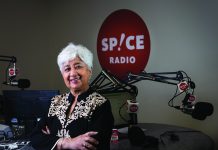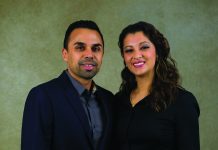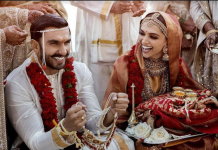by Junita Thakorlal
It was a typical Autumn day in Vancouver, overcast and drizzly, with soggy brown leaves littering the ground I walked on. But as I made my way up the stairs to the front door of the house, I was pleasantly surprised to be met by a giant Buddha statue. Several, in fact. And as the door opened, a little Beagle came out to welcome me in.
I had stepped into the living room of Dianne Watts – someone I had admired for the past twenty years for her determination, grit, professionalism, and warrior attitude. Not only was she the former Mayor of the City of Surrey, leading the city from 2005 to 2014 through trying economic times to come out as the fastest-growing city in Canada, but she also fought hard for her seat as Minister of Parliament in the South Surrey-White Rock riding in the last federal election. And now, she has made her bid for the leader of the BC Liberal Party, vying to be our next Premier.
But life for this dynamic political superstar wasn’t always easy. Growing up in East Vancouver, she was exposed to the school of hard-knocks, where being tough was mandatory for survival. As she recounted story after story of her childhood, and particularly her grandmother who spoke broken English, I was reminded of how real Dianne was and how her life lessons weren’t that different from mine, although she chose a public life. Sitting in her kitchen and chatting as she played with her two dogs and two cats, she shared insight with me about choices, politics, and overcoming adversity.
Dianne wasn’t born into greatness, she created it. After travelling the world in her young twenties, she came back to Vancouver and settled down, starting her family. In 1996, she fought hard for her seat as a city councillor in Surrey and became quite popular due to her positive energy, good work ethic, and level headedness. “There’s negativity in politics, or in any profession, no matter who you are or where you go. You have choices in life – negativity can either cripple you or make you stronger,” she shared as she put the mat outside for her dog. “It’s a process through life, dealing with adversity. But you need to develop a thick skin, and you learn to survive and always push forward.” After three terms served as Councillor, she was elected Mayor in 2005.
Although Canada had a record number of female candidates in the 2015 federal election, few were elected, including Dianne. When asked if the lack of women in leadership was due to gender bias, she shared, “I think there’s an element that women are reluctant to step into their own power and fully understand what that means. Because there’s a lot of very bright women who are more than capable to be in top positions in leadership roles. I think we’re just not used to stepping into our own power. Since ‘96 when I was elected in Surrey, the majority on council were women. This wasn’t because we established a quota system, it was because we recruited some pretty amazing women that had the ability to work together and affect change. I have 2 daughters, it’s the same thing. To give them jobs because they are female is doing them a disservice, they should be chosen out of their own merit.”
When asked what drives her to continue being in politics, she was quick to answer. “It’s about being in the service of others,” she said. “I came back to Surrey to for two reasons: the first was to be with my daughters who are 22 and 23 years old. That was the time when I, myself was going through my own personal development process to figure out who I was and what my values were as a person, so it is important for me that I be here for them as a mother. The second was because I saw so many missed opportunities provincially where I know I can make an impact and a difference. Politics is a pathway to do the work that needs to be done.”
When asked about her accomplishments, the list was long but she spent some time discussing with me her passion for child and youth issues, and how she put together and chaired the child abuse sexual exploitation task force in Surrey during her career as a Mayor. She also was instrumental in starting the tiny bundles program with the Surrey Food Bank, which is still her charity of choice. “Tiny Bundles and Sophie’s Place Child Advocacy Centre really pull at my heartstrings. When faced with difficult circumstances as a child and growing up through the formative years, the journey that a child undertakes to discover who they are is really a healing process,” she explained, her compassion clearly evident through her expression. “Giving these kids a fighting chance to live normal lives is so rewarding, I can’t say it enough. Many families can look very different; it’s important they embrace unconditional love.”
I asked her what message she has for women facing difficult situations in their personal relationships with their families and partners, to which she replied wisely, “Culturally, there is a deeper struggle for women because they have gone through a lot of trials and tribulations. But you’re not alone, there is always hope. If you don’t walk the journey of healing, you will forever be carrying that pain with you throughout your life and you deserve so much more.”
I also asked her for advice, to me as a woman of Indian origin and as an aspiring leader in my community, to which she replied, “There is no failure, there are only opportunities. And it’s important that when you stumble and fall to really look at the opportunity to learning. If someone cuts you down, be the better person and take the high road – understand where that comes from in that other person and you might find an interesting story if you look beyond their actions and behaviour.”

























